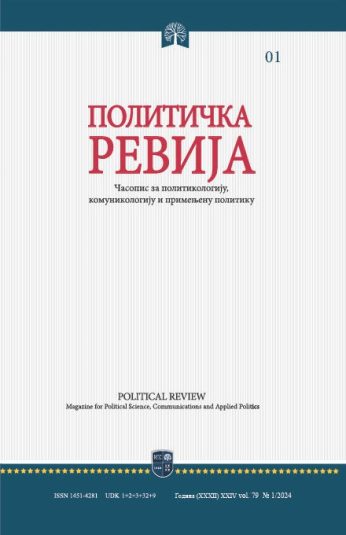Main topic
FROM POLITICAL THEORY
PROPOSAL FOR QUALITATIVE OVERCOMING PROBLEMS IN FRAGILE DEMOCRACIES
Abstract
The paper presents a critical analisys of state of democracy today, especially those that we have caled fragile democracies. In the first part of the paper we highlighted the most significant characteristics as well as the resons of their weak institutions. In our view, the most important feature is their politicization. We have also identified the very source of the politicization of the institutions, which is found in political parties. We have shown that they are the most important political actor in fragile democracies, through which political elite have control over entire society. In the teachings of Simone Weil and Robert Goodin, we have shown two diametrically oppsed views on the roll of parties in democratic a society. We have shown that the undemocratic actions of parties in fragile democracies lead to phenomenon of a „captured state“. In the second part of the paper, we made our proposal for qualitatively overcoming the situation in fragile democracies. It would reflect that the citizens should first, on the principles of deliberative democracy, establish an agenda of priority problems that burden societies of fragile democracy, and then make proposals for solving them. In our view, the best way to achieve this would be truly institutionalize deliberative democracy.
References
- Ackerman Bruce, and Fishkin James. 2004. Deliberation day. Yale University Press: New Haven & London.
- Carl, Terry. 2006. „From Democracy to Democratization before and after Transitions from Authoritarian Rule.“ In The Diversity of Democracy:Corporatism, Social Order and Political Conflict, eds. Colin Crouch and Wolfgang Streeck, 101-106. Cheltenham, UK: Edward Elgar.
- Daniel, Bensaid. 2011. ”Permanent scandal.”, In Democracy in what state?, eds. Alain Badiou and Slavoj Žižek, 29-57. Columbia University Press.
- Elstub, Stephen. 2008. Towards a Deliberative and Associational Democracy. Edinburgh: Edinburgh University Press.
- Ferrara, Alessandro. 2014. The democratic horizon: Hyperpluralism and renewal of Political liberalism. Cambridge University Press.
- Goodin, Edwin Robert. 2008. Innovating Democracy: Democratic Theory and Practice after the Deliberative Turn. Oxford: Oxford University Press.
- Gutmann Amy, and Thomson Dennis. 2004. Why Deliberative Democracy? Princeton and Oxford: Princeton University Press.
- Hartz-Karp, Janette. 2007. “Understanding Deliberativeness: Bridging Theory and Practice”. The International Journal of Public Participation,1(2): 1-23. DOI: https://doi.org/10.1146/annurev.polisci.11.081306.070555
- Lempi Džon and Koen Lenard. 2013. Prihvatanje demokratije na zapadnom Balkanu, od postkonfliktnih bitaka ka evropskoj integraciji. Beograd: Smart studio.
- Mansbridge, Jane. 2006. “Norms of Deliberative Democracy – The Inductive Study”. Journal of Public Deliberation, 2 (1): 1-47.
- Rosenberg, Shawn. (2007). ”An Introduction: Theoretical Perspectives and Empirical Research on Deliberative Democracy.” In Deliberation, Participation and Democracy: Can the People Govern? eds. Rosenberg Shawn, London: Palgrave MacMilan.
- Santiago Carlos, Nino. 1998. Constitution of Deliberative Democracy. New Haven and London: Yale University Press.
- Schedler, Andreas. 2001. ”Taking Uncertainty Seriously: The Blurred Boundaiers of democratic Transition and Consolidation”, Democratisation 8 (4):1-22. https://doi.org/10.1080/714000225
- Thompson, Dennis. 2008. „Deliberative Democratic theory and Empirical political Science”. Annual Review of Political Science 11, 497-520. DOI: https://doi.org/10.1146/annurev.polisci.11.081306.070555

